2023-2024学年英语仁爱版八年级下册 课件Unit 6 Enjoying Cycling Topic 2 Section A+嵌入视频(共30张PPT)
文档属性
| 名称 | 2023-2024学年英语仁爱版八年级下册 课件Unit 6 Enjoying Cycling Topic 2 Section A+嵌入视频(共30张PPT) | 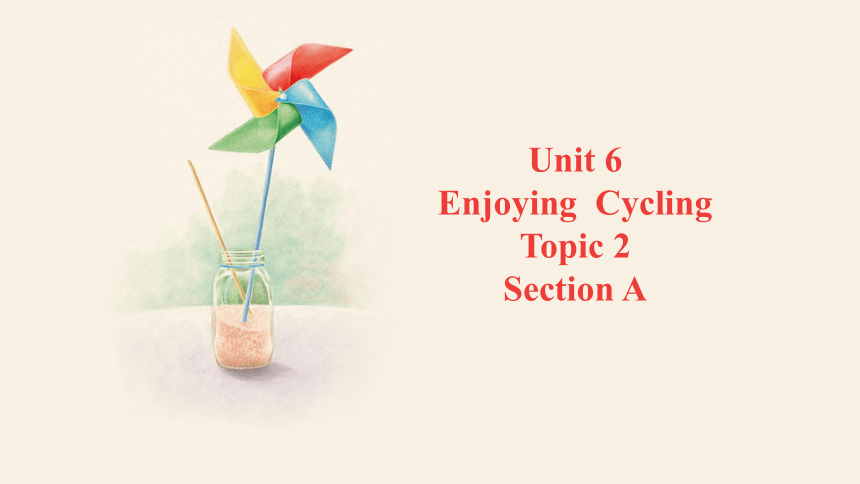 | |
| 格式 | pptx | ||
| 文件大小 | 11.9MB | ||
| 资源类型 | 教案 | ||
| 版本资源 | 仁爱科普版 | ||
| 科目 | 英语 | ||
| 更新时间 | 2024-03-16 09:44:28 | ||
图片预览

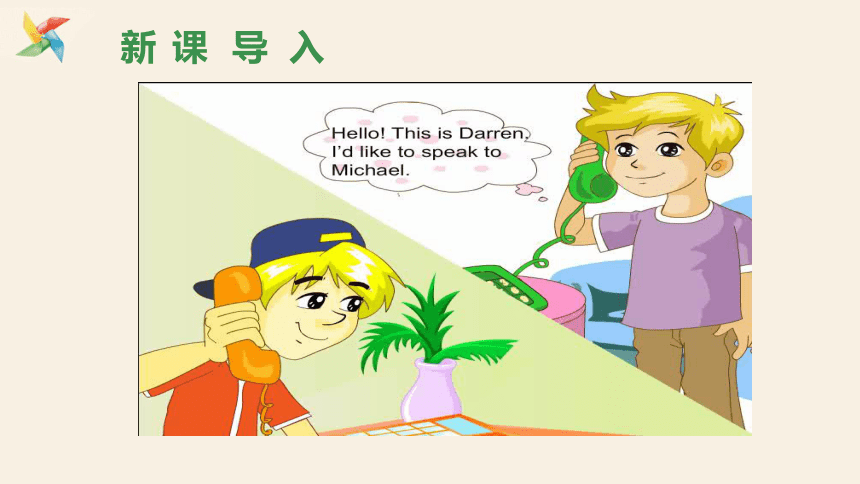
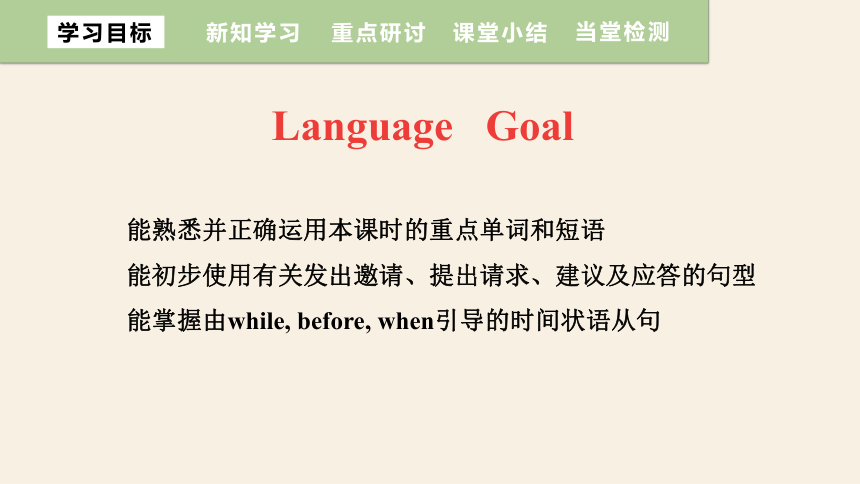
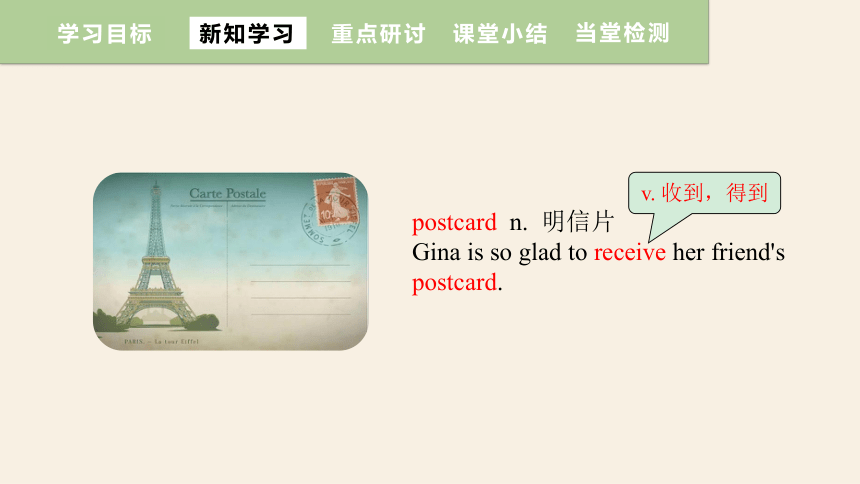
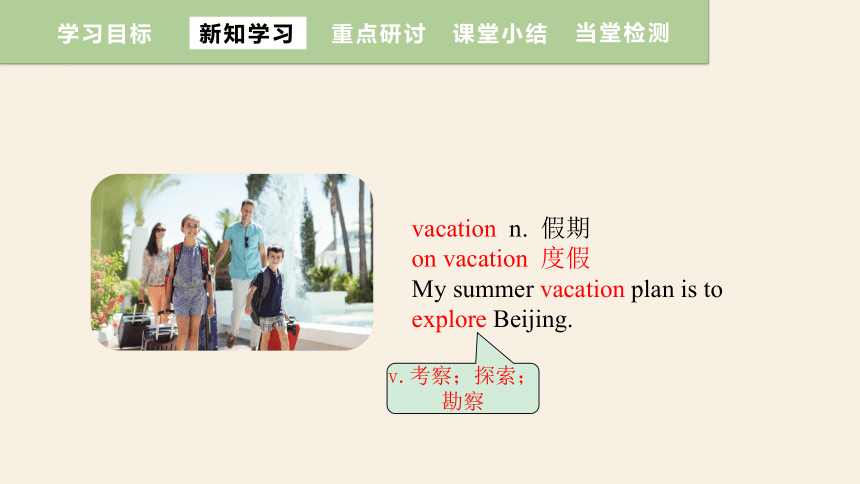
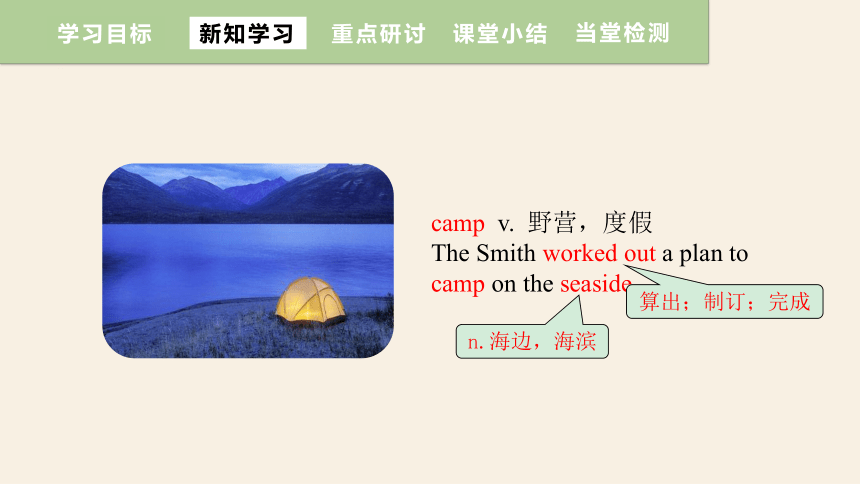
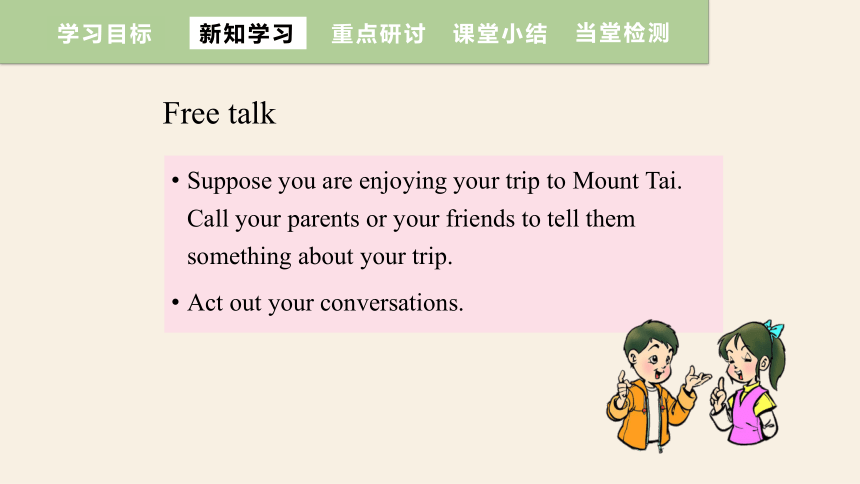
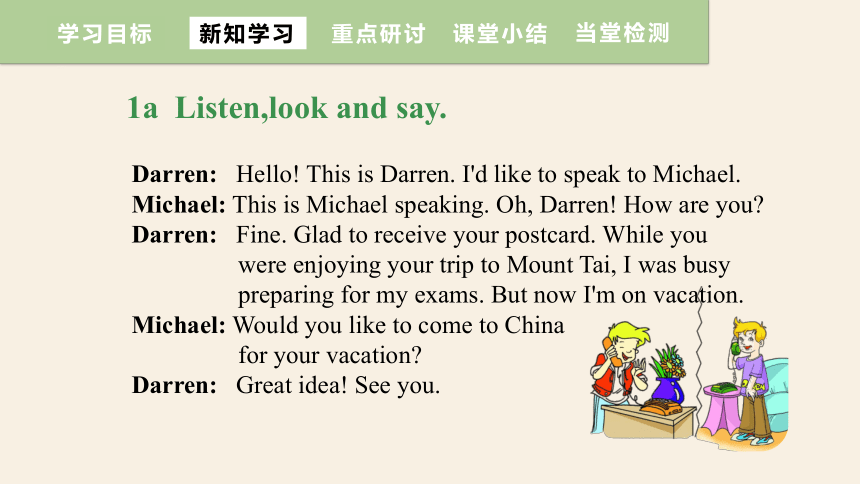
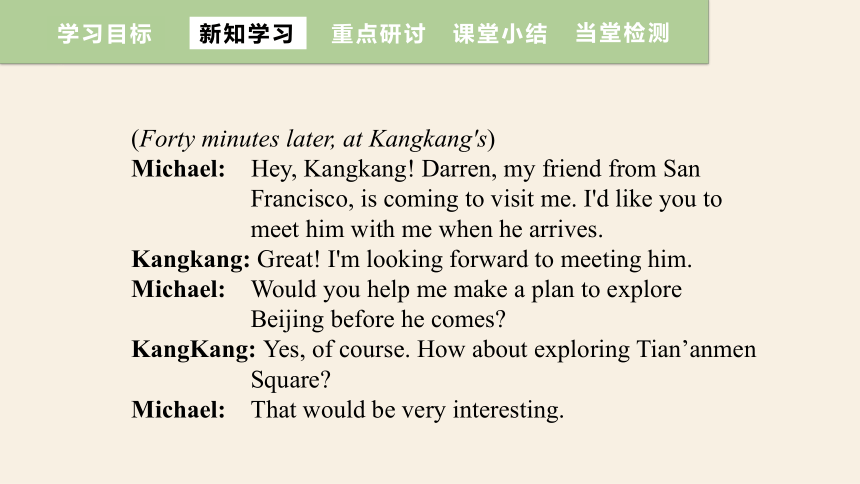
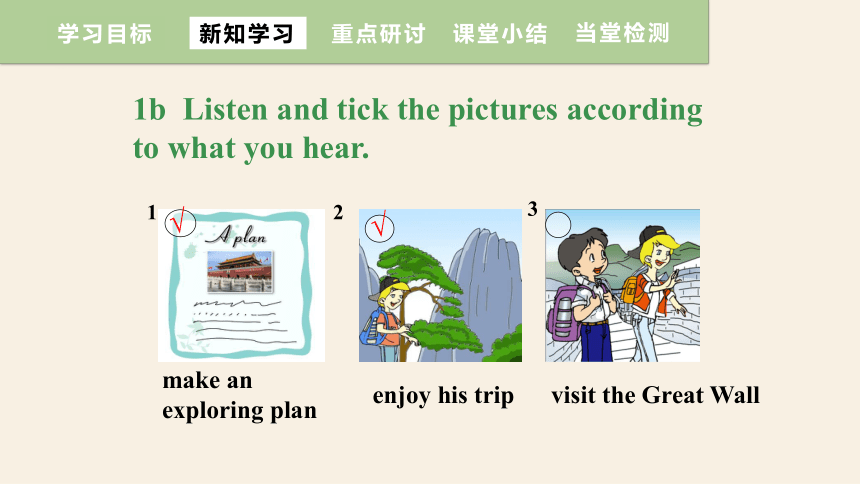
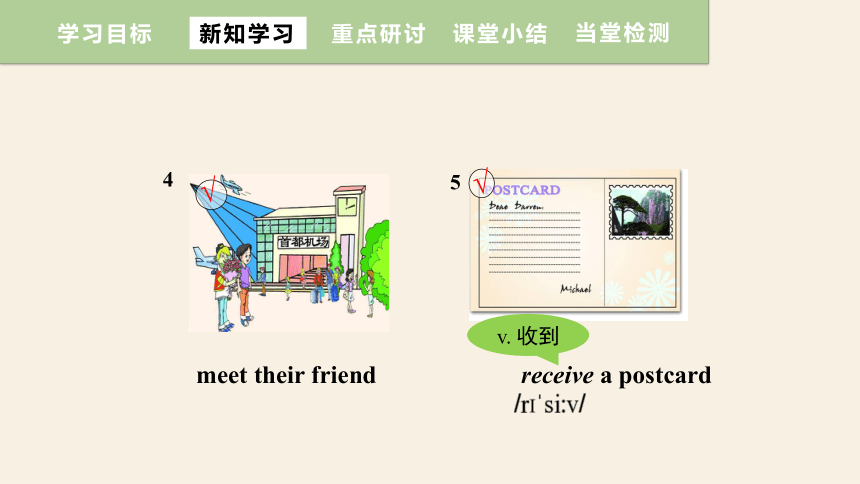
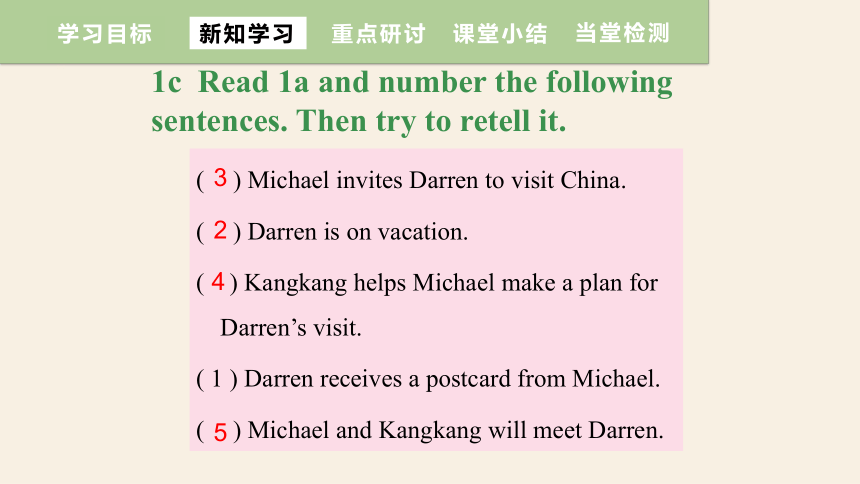
文档简介
(共30张PPT)
Unit 6
Enjoying Cycling
Topic 2
Section A
新
课
导
入
新知学习
重点研讨
课堂小结
当堂检测
学习目标
Language Goal
能熟悉并正确运用本课时的重点单词和短语
能初步使用有关发出邀请、提出请求、建议及应答的句型
能掌握由while, before, when引导的时间状语从句
新知学习
重点研讨
课堂小结
当堂检测
学习目标
postcard n. 明信片
Gina is so glad to receive her friend's postcard.
v. 收到,得到
新知学习
重点研讨
课堂小结
当堂检测
学习目标
vacation n. 假期
on vacation 度假
My summer vacation plan is to explore Beijing.
v.考察;探索;勘察
新知学习
重点研讨
课堂小结
当堂检测
学习目标
camp v. 野营,度假
The Smith worked out a plan to camp on the seaside.
算出;制订;完成
n.海边,海滨
新知学习
重点研讨
课堂小结
当堂检测
学习目标
Suppose you are enjoying your trip to Mount Tai. Call your parents or your friends to tell them something about your trip.
Act out your conversations.
Free talk
新知学习
重点研讨
课堂小结
当堂检测
学习目标
1a Listen,look and say.
Darren: Hello! This is Darren. I'd like to speak to Michael.
Michael: This is Michael speaking. Oh, Darren! How are you
Darren: Fine. Glad to receive your postcard. While you
were enjoying your trip to Mount Tai, I was busy
preparing for my exams. But now I'm on vacation.
Michael: Would you like to come to China
for your vacation
Darren: Great idea! See you.
新知学习
重点研讨
课堂小结
当堂检测
学习目标
(Forty minutes later, at Kangkang's)
Michael: Hey, Kangkang! Darren, my friend from San
Francisco, is coming to visit me. I'd like you to
meet him with me when he arrives.
Kangkang: Great! I'm looking forward to meeting him.
Michael: Would you help me make a plan to explore
Beijing before he comes
KangKang: Yes, of course. How about exploring Tian’anmen
Square
Michael: That would be very interesting.
新知学习
重点研讨
课堂小结
当堂检测
学习目标
1b Listen and tick the pictures according to what you hear.
visit the Great Wall
enjoy his trip
make an exploring plan
√
√
1
2
3
新知学习
重点研讨
课堂小结
当堂检测
学习目标
v. 收到
receive a postcard
meet their friend
√
√
4
5
新知学习
重点研讨
课堂小结
当堂检测
学习目标
1c Read 1a and number the following sentences. Then try to retell it.
( ) Michael invites Darren to visit China.
( ) Darren is on vacation.
( ) Kangkang helps Michael make a plan for Darren’s visit.
( 1 ) Darren receives a postcard from Michael.
( ) Michael and Kangkang will meet Darren.
3
2
4
5
新知学习
重点研讨
课堂小结
当堂检测
学习目标
Key words:
speak to, receive, postcard, trip, exams, vacation, would you like…,
from, meet, look forward to, plan, explore, Tian’anmen Square
Act the dialogue out with your partners.
新知学习
重点研讨
课堂小结
当堂检测
学习目标
2 Read and match the sentences.
Would / Will you help me plan a trip
Could / Can you come along with us
Shall we take him there
All right.
No, let’s not.
Sorry, I’m afraid I have no time.
Yes, I can.
Yes, I’d love to.
I’m sorry I can’t.
新知学习
重点研讨
课堂小结
当堂检测
学习目标
3 Look at the pictures and make sentences with while or when.
have a class / climb
run / swim
dance / sing
Example:
Darren was having a class while Michael was climbing a mountain.
Maria was swimming while Jane was running.
Michael was singing while Jane was dancing.
新知学习
重点研讨
课堂小结
当堂检测
学习目标
read / come in
watch / ring
write / knock at
Example:
Darren was reading when Michael came in.
Kangkang was watching TV when the telephone rang.
Kangkang and Jane were writing when Michael knocked at the door.
新知学习
重点研讨
课堂小结
当堂检测
学习目标
4 Listen to the conversation and choose the correct answers.
1. Diana’s perfect holiday activity is ______.
A. riding B. camping C. fishing
2. Diana and Lily should ______ for the holiday.
A. learn to swim in the sea.
B. know more about camping
C. work out the cost carefully
3. Where do they decide to go finally
A. Go to the seaside. B. Camp in the forest.
C. We don’t know.
算出,解决to find out the answer or to solve sth.
Language points
新知学习
重点研讨
课堂小结
当堂检测
学习目标
1. While you were enjoying your trip to Mount Tai, I was
busy preparing for my exams.
你在享受旅游泰山之乐时,我正忙着准备考试。
1)A. 这是一个由连词While引导的时间状语从句。
当一个动作正在进行时,另一个动作也同时在发生,
有对比的意味,一般主从句都用现在进行时或过去
进行时。
e.g. I was doing my homework while mom was cooking.
妈妈做饭时,我在做作业。
B. 时间状语从句可以放在主句之前,也可以放在主
句之后。
e.g. While mom was cooking, I was doing my homework. 妈妈做饭时,我在做作业。
需要注意的是:从句在前面时,主从句之间要用逗号隔开。
2)be busy doing sth.忙于做某事,后面还可接名词,即be busy with sth.忙于某事。
e.g. I am busy doing my homework. = I am busy with my homework. 我忙于做作业。
3)prepare for(doing)sth 准备(做)某事;
e.g. The students are preparing for the coming exams.
学生正在准备即将到来的考试。
新知学习
重点研讨
课堂小结
当堂检测
学习目标
新知学习
重点研讨
课堂小结
当堂检测
学习目标
2. I’m looking forward to meeting him. 我盼着与他见面。
look forward to 意为“期待,盼望”,to 是介词,后
面可加名词、代词或动名词;
e.g. He is looking forward to going abroad.
他期待去国外。
新知学习
重点研讨
课堂小结
当堂检测
学习目标
3. Would you help me make a plan to explore Beijing
before he comes
在他来之前,你能帮我制订一个探索北京的计划吗?
1) Would you 比will you 语气更加客气,委婉, 类
似还有:could you.......
e.g. Could you come along with us
你要和我们一起吗?
2) A. make a plan to do sth.制订计划做某事;
e.g. The boy made a plan to visit around the world.
男孩制订了一个环游全世界的计划。
B. make a plan for sth.为某事制订计划;
e.g. I made a plan for my summer vacation.
我为我的暑假制订了一个计划。
3) explore 动词, 意为“考察(某地区),探险,勘察”;
e.g. He went out to explore.他出去考察了。
扩展:explorer 名词,意为“探险家,探测者”;
e.g. She wants to be an explorer when she grows up.
当她长大后,她想成为一名探险家。
新知学习
重点研讨
课堂小结
当堂检测
学习目标
新知学习
重点研讨
课堂小结
当堂检测
学习目标
4. Would you help me plan a trip
请你帮我定个旅行计划好吗?
1) A. Would 与you 连用表示请求或要求;won’t
you加强邀请的语气。但would 比will语气更加客气,
委婉。
e.g. Will you come this way, please 请这边走好吗?
Won’t you coming in and take a seat
你怎么不进来找个位子坐下?
B. Will you.... 和 Would you.... 在表达“请求”时用
法完全一样,其答语也相同。只是后者更有礼貌。 e.g. —Will /Would you have some more tea
再喝点茶,好吗?
—Yes, please. 好的。 / No, thank you. 不,谢谢。
2)trip 作可数名词,意为“旅行,旅程”。 动词短语 plan a trip 意为“制定旅行计划”。
新知学习
重点研讨
课堂小结
当堂检测
学习目标
5. Could/ Can you come along with us
你和我们一起来好吗
1)在表达请求别人做某事常用can/ could,could 更
礼貌。肯定回答时用:can/may, 不用could。
e.g. —Could/ Can I ask you a question, Mr. Lee
李老师,我可以问你一个问题吗?
—Yes, of course you can. 当然可以。
2)come along (with) 意为“跟着来,跟随”;
e.g. Ray had some work to finish and decided to come
along later.
雷还有些工作要做完,决定迟点儿再来。
新知学习
重点研讨
课堂小结
当堂检测
学习目标
6. Shall we take him here
我们带他去那儿好吗?
A.shall和 will 都用与一般将来时,但shall 只用于第
一人称。
e.g. I shall/ will buy a computer this Sunday.
这个礼拜天我将买一台电脑。
B.Shall we/I..... 表示向对方征求意见,提出建议,
意为“……好吗?”
e.g. Shall we go swimming tomorrow
我们明天去游泳好吗?
新知学习
重点研讨
课堂小结
当堂检测
学习目标
7. Darren was reading a newspaper when Michael came in.
当迈克尔进来时,达伦正在看报纸。
此句也可以改成:Michael came in when/while Darren
was reading a newspaper.
while引导的时间状语从句,用于表达持续性的动词
或状态,不能与表示短暂性动词连用,但when两者
皆可以。
新知学习
重点研讨
课堂小结
当堂检测
学习目标
新知学习
重点研讨
课堂小结
当堂检测
学习目标
Unit 6 Topic 2
Section A
重点单词和短语:
receive, postcard, vacation, on vacation, work out, on vacation, look forward to
while, when等连词引导的时间状语从句:
引导时间状语从句的连接词有1______ ,2.______ 等。主句是一般将来时,从句用3.__________(时态)。主句是过去时,从句也要用相应的时态。
对方发出邀请、提出请求和建议及回答:
表示建议的句型Would/ will you… Could/Can you… 以及Shall we... 其肯定回答是:
1. ____________或2._________. 否定的回答是:3._____________或4.______________________.
when
一般现在时
Yes, I’d love to
All right
while
I’m sorry I can’t.
No, let’s not.
新知学习
重点研讨
课堂小结
当堂检测
学习目标
1. We send each other _________ before the New Year
comes.
2. It’s better to give than to ________.
3. In China, students usually have a two-month summer
________.
4. You’d better plan the trip carefully ______ you start.
5. What about going _______ in the forest next weekend
receive camping before postcard vacation
postcards
receive
vacation
before
camping
一、用方框内所给词的适当形式填空。
1. —下午去公园好吗?
—好主意!
2. 昨天当我回到家的时候正下着大雨。
3. 刚才我在做作业,而我妈妈在炒菜。
新知学习
重点研讨
课堂小结
当堂检测
学习目标
二、翻译句子。
—Would you like to go to the park this afternoon
—Great idea!
It was raining heavily when I got home yesterday.
I was doing my homework just now while my mother was cooking.
Unit 6
Enjoying Cycling
Topic 2
Section A
新
课
导
入
新知学习
重点研讨
课堂小结
当堂检测
学习目标
Language Goal
能熟悉并正确运用本课时的重点单词和短语
能初步使用有关发出邀请、提出请求、建议及应答的句型
能掌握由while, before, when引导的时间状语从句
新知学习
重点研讨
课堂小结
当堂检测
学习目标
postcard n. 明信片
Gina is so glad to receive her friend's postcard.
v. 收到,得到
新知学习
重点研讨
课堂小结
当堂检测
学习目标
vacation n. 假期
on vacation 度假
My summer vacation plan is to explore Beijing.
v.考察;探索;勘察
新知学习
重点研讨
课堂小结
当堂检测
学习目标
camp v. 野营,度假
The Smith worked out a plan to camp on the seaside.
算出;制订;完成
n.海边,海滨
新知学习
重点研讨
课堂小结
当堂检测
学习目标
Suppose you are enjoying your trip to Mount Tai. Call your parents or your friends to tell them something about your trip.
Act out your conversations.
Free talk
新知学习
重点研讨
课堂小结
当堂检测
学习目标
1a Listen,look and say.
Darren: Hello! This is Darren. I'd like to speak to Michael.
Michael: This is Michael speaking. Oh, Darren! How are you
Darren: Fine. Glad to receive your postcard. While you
were enjoying your trip to Mount Tai, I was busy
preparing for my exams. But now I'm on vacation.
Michael: Would you like to come to China
for your vacation
Darren: Great idea! See you.
新知学习
重点研讨
课堂小结
当堂检测
学习目标
(Forty minutes later, at Kangkang's)
Michael: Hey, Kangkang! Darren, my friend from San
Francisco, is coming to visit me. I'd like you to
meet him with me when he arrives.
Kangkang: Great! I'm looking forward to meeting him.
Michael: Would you help me make a plan to explore
Beijing before he comes
KangKang: Yes, of course. How about exploring Tian’anmen
Square
Michael: That would be very interesting.
新知学习
重点研讨
课堂小结
当堂检测
学习目标
1b Listen and tick the pictures according to what you hear.
visit the Great Wall
enjoy his trip
make an exploring plan
√
√
1
2
3
新知学习
重点研讨
课堂小结
当堂检测
学习目标
v. 收到
receive a postcard
meet their friend
√
√
4
5
新知学习
重点研讨
课堂小结
当堂检测
学习目标
1c Read 1a and number the following sentences. Then try to retell it.
( ) Michael invites Darren to visit China.
( ) Darren is on vacation.
( ) Kangkang helps Michael make a plan for Darren’s visit.
( 1 ) Darren receives a postcard from Michael.
( ) Michael and Kangkang will meet Darren.
3
2
4
5
新知学习
重点研讨
课堂小结
当堂检测
学习目标
Key words:
speak to, receive, postcard, trip, exams, vacation, would you like…,
from, meet, look forward to, plan, explore, Tian’anmen Square
Act the dialogue out with your partners.
新知学习
重点研讨
课堂小结
当堂检测
学习目标
2 Read and match the sentences.
Would / Will you help me plan a trip
Could / Can you come along with us
Shall we take him there
All right.
No, let’s not.
Sorry, I’m afraid I have no time.
Yes, I can.
Yes, I’d love to.
I’m sorry I can’t.
新知学习
重点研讨
课堂小结
当堂检测
学习目标
3 Look at the pictures and make sentences with while or when.
have a class / climb
run / swim
dance / sing
Example:
Darren was having a class while Michael was climbing a mountain.
Maria was swimming while Jane was running.
Michael was singing while Jane was dancing.
新知学习
重点研讨
课堂小结
当堂检测
学习目标
read / come in
watch / ring
write / knock at
Example:
Darren was reading when Michael came in.
Kangkang was watching TV when the telephone rang.
Kangkang and Jane were writing when Michael knocked at the door.
新知学习
重点研讨
课堂小结
当堂检测
学习目标
4 Listen to the conversation and choose the correct answers.
1. Diana’s perfect holiday activity is ______.
A. riding B. camping C. fishing
2. Diana and Lily should ______ for the holiday.
A. learn to swim in the sea.
B. know more about camping
C. work out the cost carefully
3. Where do they decide to go finally
A. Go to the seaside. B. Camp in the forest.
C. We don’t know.
算出,解决to find out the answer or to solve sth.
Language points
新知学习
重点研讨
课堂小结
当堂检测
学习目标
1. While you were enjoying your trip to Mount Tai, I was
busy preparing for my exams.
你在享受旅游泰山之乐时,我正忙着准备考试。
1)A. 这是一个由连词While引导的时间状语从句。
当一个动作正在进行时,另一个动作也同时在发生,
有对比的意味,一般主从句都用现在进行时或过去
进行时。
e.g. I was doing my homework while mom was cooking.
妈妈做饭时,我在做作业。
B. 时间状语从句可以放在主句之前,也可以放在主
句之后。
e.g. While mom was cooking, I was doing my homework. 妈妈做饭时,我在做作业。
需要注意的是:从句在前面时,主从句之间要用逗号隔开。
2)be busy doing sth.忙于做某事,后面还可接名词,即be busy with sth.忙于某事。
e.g. I am busy doing my homework. = I am busy with my homework. 我忙于做作业。
3)prepare for(doing)sth 准备(做)某事;
e.g. The students are preparing for the coming exams.
学生正在准备即将到来的考试。
新知学习
重点研讨
课堂小结
当堂检测
学习目标
新知学习
重点研讨
课堂小结
当堂检测
学习目标
2. I’m looking forward to meeting him. 我盼着与他见面。
look forward to 意为“期待,盼望”,to 是介词,后
面可加名词、代词或动名词;
e.g. He is looking forward to going abroad.
他期待去国外。
新知学习
重点研讨
课堂小结
当堂检测
学习目标
3. Would you help me make a plan to explore Beijing
before he comes
在他来之前,你能帮我制订一个探索北京的计划吗?
1) Would you 比will you 语气更加客气,委婉, 类
似还有:could you.......
e.g. Could you come along with us
你要和我们一起吗?
2) A. make a plan to do sth.制订计划做某事;
e.g. The boy made a plan to visit around the world.
男孩制订了一个环游全世界的计划。
B. make a plan for sth.为某事制订计划;
e.g. I made a plan for my summer vacation.
我为我的暑假制订了一个计划。
3) explore 动词, 意为“考察(某地区),探险,勘察”;
e.g. He went out to explore.他出去考察了。
扩展:explorer 名词,意为“探险家,探测者”;
e.g. She wants to be an explorer when she grows up.
当她长大后,她想成为一名探险家。
新知学习
重点研讨
课堂小结
当堂检测
学习目标
新知学习
重点研讨
课堂小结
当堂检测
学习目标
4. Would you help me plan a trip
请你帮我定个旅行计划好吗?
1) A. Would 与you 连用表示请求或要求;won’t
you加强邀请的语气。但would 比will语气更加客气,
委婉。
e.g. Will you come this way, please 请这边走好吗?
Won’t you coming in and take a seat
你怎么不进来找个位子坐下?
B. Will you.... 和 Would you.... 在表达“请求”时用
法完全一样,其答语也相同。只是后者更有礼貌。 e.g. —Will /Would you have some more tea
再喝点茶,好吗?
—Yes, please. 好的。 / No, thank you. 不,谢谢。
2)trip 作可数名词,意为“旅行,旅程”。 动词短语 plan a trip 意为“制定旅行计划”。
新知学习
重点研讨
课堂小结
当堂检测
学习目标
5. Could/ Can you come along with us
你和我们一起来好吗
1)在表达请求别人做某事常用can/ could,could 更
礼貌。肯定回答时用:can/may, 不用could。
e.g. —Could/ Can I ask you a question, Mr. Lee
李老师,我可以问你一个问题吗?
—Yes, of course you can. 当然可以。
2)come along (with) 意为“跟着来,跟随”;
e.g. Ray had some work to finish and decided to come
along later.
雷还有些工作要做完,决定迟点儿再来。
新知学习
重点研讨
课堂小结
当堂检测
学习目标
6. Shall we take him here
我们带他去那儿好吗?
A.shall和 will 都用与一般将来时,但shall 只用于第
一人称。
e.g. I shall/ will buy a computer this Sunday.
这个礼拜天我将买一台电脑。
B.Shall we/I..... 表示向对方征求意见,提出建议,
意为“……好吗?”
e.g. Shall we go swimming tomorrow
我们明天去游泳好吗?
新知学习
重点研讨
课堂小结
当堂检测
学习目标
7. Darren was reading a newspaper when Michael came in.
当迈克尔进来时,达伦正在看报纸。
此句也可以改成:Michael came in when/while Darren
was reading a newspaper.
while引导的时间状语从句,用于表达持续性的动词
或状态,不能与表示短暂性动词连用,但when两者
皆可以。
新知学习
重点研讨
课堂小结
当堂检测
学习目标
新知学习
重点研讨
课堂小结
当堂检测
学习目标
Unit 6 Topic 2
Section A
重点单词和短语:
receive, postcard, vacation, on vacation, work out, on vacation, look forward to
while, when等连词引导的时间状语从句:
引导时间状语从句的连接词有1______ ,2.______ 等。主句是一般将来时,从句用3.__________(时态)。主句是过去时,从句也要用相应的时态。
对方发出邀请、提出请求和建议及回答:
表示建议的句型Would/ will you… Could/Can you… 以及Shall we... 其肯定回答是:
1. ____________或2._________. 否定的回答是:3._____________或4.______________________.
when
一般现在时
Yes, I’d love to
All right
while
I’m sorry I can’t.
No, let’s not.
新知学习
重点研讨
课堂小结
当堂检测
学习目标
1. We send each other _________ before the New Year
comes.
2. It’s better to give than to ________.
3. In China, students usually have a two-month summer
________.
4. You’d better plan the trip carefully ______ you start.
5. What about going _______ in the forest next weekend
receive camping before postcard vacation
postcards
receive
vacation
before
camping
一、用方框内所给词的适当形式填空。
1. —下午去公园好吗?
—好主意!
2. 昨天当我回到家的时候正下着大雨。
3. 刚才我在做作业,而我妈妈在炒菜。
新知学习
重点研讨
课堂小结
当堂检测
学习目标
二、翻译句子。
—Would you like to go to the park this afternoon
—Great idea!
It was raining heavily when I got home yesterday.
I was doing my homework just now while my mother was cooking.
同课章节目录
- Unit 5 Feeling excited
- Topic 1 You look excited
- Topic 2 I’m feeling better now.
- Topic 3 Many things can affect our feelings.
- Unit 6 Enjoying Cycling
- Topic 1 We're going on a three-day visit to Mount
- Topic 2 How about exploring Tian’anmen Square?
- Topic 3 Bicycle riding is good exercise.
- Unit 7 Food festival
- Topic 1 We’re preparing for a food festival.
- Topic 2 I’m not sure whether I can cook it well.
- Topic 3 I Cooked the Most Successfully
- Unit 8 Our Clothes
- Topic 1 We will have a class fashion show.
- Topic 2 We can design our own uniforms.
- Topic 3 He said the fashion show was wonderful.
